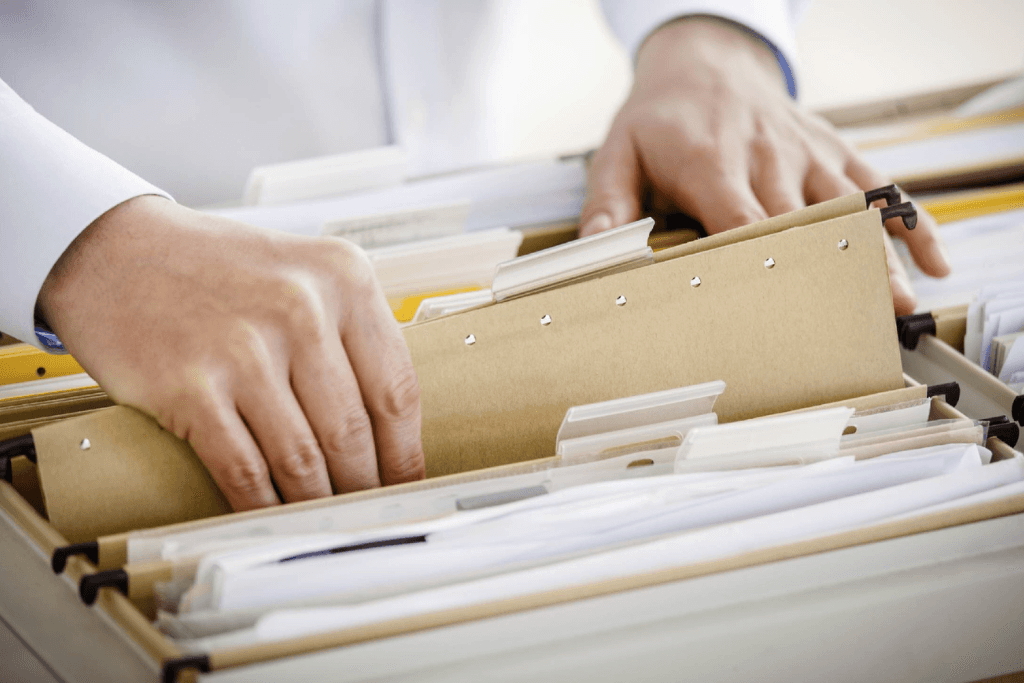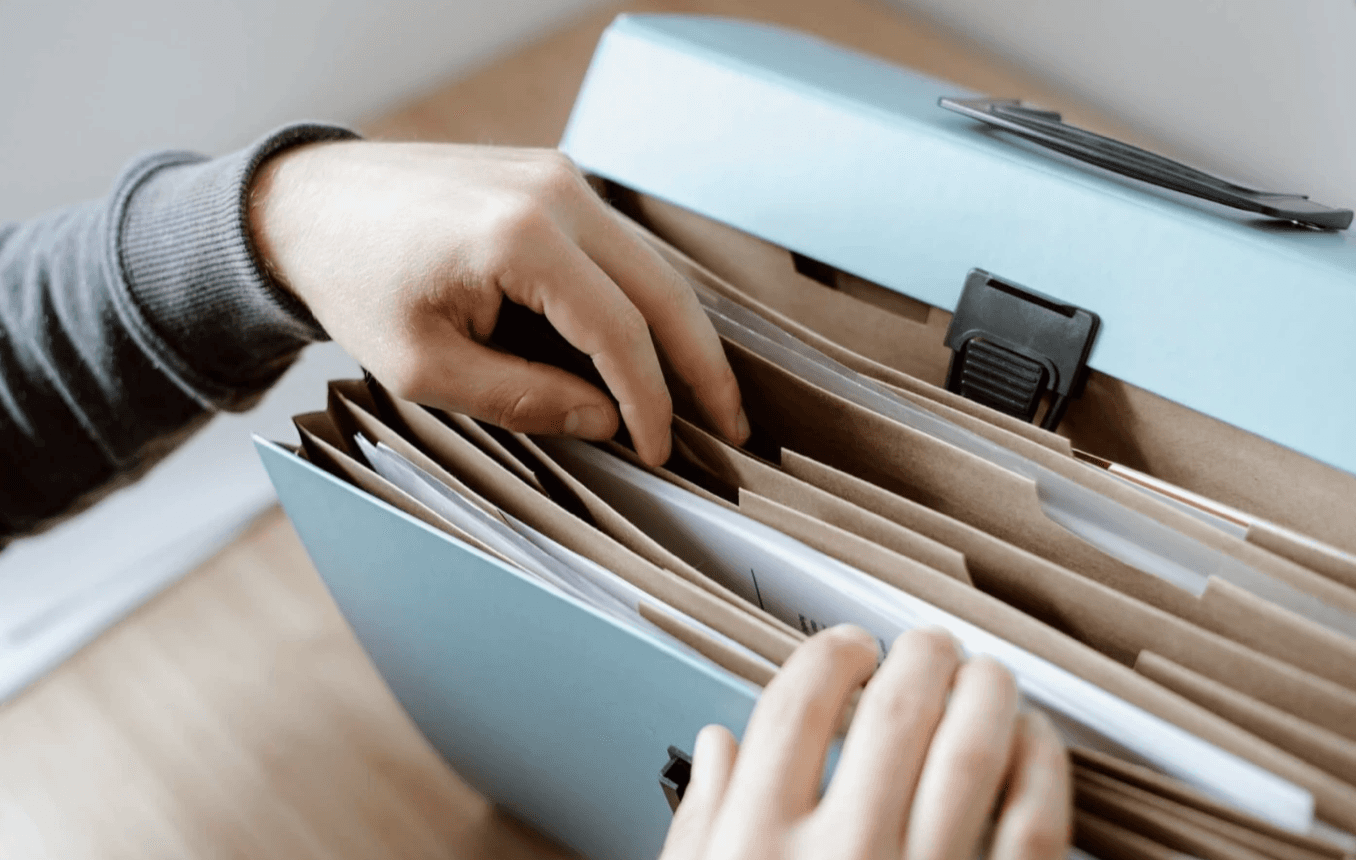Divorce or separation is challenging and comes with extensive paperwork. Keeping it organized is essential for future legal, financial, and personal needs like custody, remarriage, or refinancing.
We’ll explain how to create a well-organized system to save time and reduce unnecessary stress.
Key Takeaways
Essential documents you need to keep include divorce decrees, custody agreements, and property division papers.
To keep things streamlined, set up an organized filing system for your papers.
Use Trustworthy to keep all essential documents safe. Its Family Operating System® offers security features such as AES 256-bit encryption, multi-factor authentication, and biometric authentication.
Divorce and Separation Documents to Keep

Seth Persily, attorney and CEO at Elite Litigators, advises: “Divorce and separation documents are incredibly important to retain. These documents include your divorce decree, any legal agreements regarding alimony, child support, custody arrangements, and property division.
"I also recommend keeping a record of all communication related to the divorce, such as emails, letters, or financial records of shared assets or liabilities. It’s important to store these documents securely, as they may need to be referenced in the future.”
An organized filing system is crucial for legal preparedness, financial clarity, keeping your documents secure and accessible. Here is a complete list of important divorce and separation documents to keep:
Divorce decree or separation agreement: This crucial court-approved document outlines the terms of your divorce.
Child custody and visitation schedules: These documents are very important and include all the details of custody agreements and visitation rights.
Financial settlement agreements: These include documents outlining child support responsibilities, spousal support, and other financial obligations for future financial planning and compliance.
Property division agreements: They outline how debts and assets have been divided between you and your former spouse.
Retirement account or pension division documents: These include documents like a qualified domestic relations order, or QDRO. This legal order allows you to receive a portion or all of the retirement plan benefits even if you did not own the plan.
Prenuptial or postnuptial agreements: It’s important to keep copies of these documents in case of financial disputes.
Any correspondence or emails related to the divorce: In case of disputes or other legal issues, you will need to have all forms of correspondence regarding the divorce, such as emails, letters, and messages.
Create a Centralized System for Paperwork
Once you’ve gathered your important divorce or legal separation documents, create a centralized system to easily access the documents when needed. Should you choose to keep paper documents, create a system for easy access using binders, file folders, or document organizers. Simple tools like colored tabs can help.
Your documents will be more secure if you store digital versions in Trustworthy's Family Operating System, which is designed to organize and store essential documents effortlessly.
Features like customizable templates, automated suggestions, and smart reminders make managing documents simple. With a few clicks on your phone or computer, you can quickly access the exact document you need.
Steps to Organize Your Documents

Once you choose your storage method, start the process of organizing your documents using these simple steps:
Gather All Relevant Documents
Gather all the relevant paperwork, such as divorce decrees, child custody and visitation schedules, financial settlements, retirement accounts and pension divisions, and all prenuptial or postnuptial agreements. You can obtain these documents from lawyers and courts, as well as from your files.
During this step, check every possible document source to avoid missing crucial documents.
Categorize Documents by Type
Make accessing your organized paperwork easy by categorizing documents by type. You can create categories for legal, financial, education, and parenting. Save time creating categories from scratch using Trustworthy’s predefined categories for auto-filing.
Use a Checklist
Download Trustworthy's divorce checklist to make sure nothing gets missed.
Using Technology for Digital Document Organization
Digital documentation simplifies organization by replacing hours of filing with quick scanning and digitizing.
The Trustworthy mobile app's built-in scanner makes uploading and organizing simple.. Trustworthy's Autopilot creates summaries of your documents and suggests categories and document names, further streamlining the organizational process.
Trustworthy also provides automated reminders for updates and deadlines, plus secure sharing with trusted collaborators like family members and lawyers.
How to Ensure Security and Privacy
You'll need to protect the documents related to your divorce, whether you store them physically or digitally.
For physical storage, use waterproof and fireproof safes to prevent damage. Keep safes in secure but accessible locations. Alternatively, store important documents off-site in a safety deposit box at a financial institution.
For digital storage, choose cloud platforms with strong security, like Trustworthy. It offers bank-level protection with AES 256-bit encryption, multi-factor and biometric authentication, physical security keys, and on-screen redaction. Advanced threat detection monitors for unusual activity, sending immediate alerts for suspicious behavior.
Trustworthy also uses tokenization, replacing sensitive data with unique tokens to ensure original information is stored securely outside your account.
When sharing sensitive documents, avoid unencrypted email. Trustworthy’s SecureLinks™ feature allows you to create view-only links, control access, and set expiration dates, ensuring secure sharing with people outside your trusted network.
What to Do If You Can't Find Documents
Misplacing documents is common when setting up an organized system. If you find divorce documents missing, don’t worry — you can request copies from the court clerk’s office handling your case, though a small fee may apply.
You can also request copies from your attorney. For financial documents, contact your bank, retirement plan administrators, or financial institutions.
Once you receive the copies, upload and file them promptly to prevent future loss.
Tips for Continued Document Management

Document organization is a continuing task that requires regular updates to keep information safe, organized, and current. Fortunately, digital tools can simplify this process.
Set reminders for updates on custody schedules, support payments, and financial agreements to stay compliant. Trustworthy can help by creating alerts and reminders.
Keep records of payments and receipts for child or spousal support to prevent future disputes. Trustworthy’s financial tab helps track budgets and set payment reminders to avoid penalties.
Regularly review and update documents. Set a consistent schedule — weekly, monthly, or annually, depending on the documents. Always update documents after major life events.
Long-Term Storage Solutions
Knowing which documents to keep or discard is key to an updated and organized system. Documents to keep indefinitely include divorce decrees, child custody agreements, and property division papers.
Documents with outdated information or closed accounts can eventually be discarded after a few years. If you’re getting rid of old documents containing personal information, make sure to use a paper shredder to protect your information.
When to Seek Professional Help
Divorce paperwork can be overwhelming, and seeking professional help is a smart option. For that next-level support, Trustworthy members get access to a Trustworthy Certified Expert™.
Trustworthy's experts offer personalized, one-on-one support. They can help Trustworthy users with onboarding documents and creating digital organization strategies, or even helping families choose the right lawyer or pick appropriate insurance plans.
Additionally, support groups and online forums can provide emotional support and guidance from others facing similar challenges.
Frequently Asked Questions
How do I decide between physical and digital storage?
If you’re looking to store large amounts of paperwork, choosing to go digital is a great option to save you time and space.
What should I do if my ex-spouse refuses to provide the necessary documents?
If this happens, it is best to involve a third party like your lawyer to deal directly with your ex-spouse, or contact your local court for assistance.
How do I ensure my children have access to documents in the future?
You can leave instructions in your estate planning documents or make use of Trustworthy’s legacy feature, which allows trusted individuals access to your documents if something happens to you.
We’d love to hear from you! Feel free to email us with any questions, comments, or suggestions for future article topics.
Trustworthy is an online service providing legal forms and information. We are not a law firm and do not provide legal advice.











